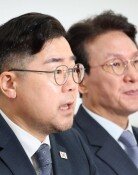Re-employment for retiring baby boomers
Re-employment for retiring baby boomers
Posted April. 18, 2012 06:29,
I cry out loud while jogging early in the morning to avoid shedding tears while talking with a consultant on finding a new job, This is what a 53-year-old man told a consultant at the Labor and Management Joint Re-employment Assistance Center in Seoul`s Mapo district. The man was a plant manager at an auto parts company and later ran an auto interior materials business. When he closed his company due to a cash crunch, he shed no tears but said he gets teary-eyed when he thinks of his wife, who makes breakfast for him every morning, and their two children.
Jeong Do-yeong, a consultant at a similar job center under the Incheon City, gives advice to middle-aged jobseekers, saying, The world changes and people change. Unless you change, you cannot find a new job. In his book After 40, Between Fears and Thrills, he said, You should give up a hollow dream after 40, and understand clearly how you are assessed by the (job) market. Jeong`s advice is to find a job that only a certain person can do and to take advantage of ones career background. Make a brand image of yourself to find a job through your network, which is a better way to find a job than (answering) a want ad.
The official retirement age at Korean companies is around 56 on average but the real age is 54.1. As more baby boomers born between 1955 and 1963 begin to retire, more people are likely to find jobs after retirement. Baby boomers comprise 14.6 percent of the Korean population or 7.12 million. Just a few of them have stable sources of revenue such as pension and real estate income. Many receive national pension payments of under 1 million won (879 U.S. dollars) earlier than scheduled. The government and politicians should keep in mind that unless such retirees have a stable livelihood, they could turn into political dissidents.
A consulting service to re-employ retired American soldiers after World War II was developed into a retiree assistance program in a period of economic downturn in the 1960s. The program was implemented at most large companies that went through restructuring in 1980. A consulting company that signed a contract with a company takes care of all the details. The European Union provides employment service for retirees with funds raised by member countries. Japan launched a job training program for those three years away from retirement in the 1990s. Korean companies can be loved by the public only if they provide systematic job training for retirees and introduce them other job opportunities.
Editorial Writer Hong Kwon-hee (konihong@donga.com)







